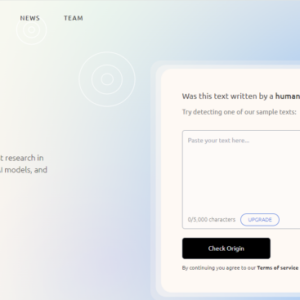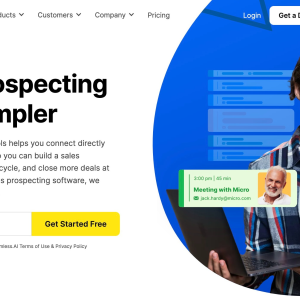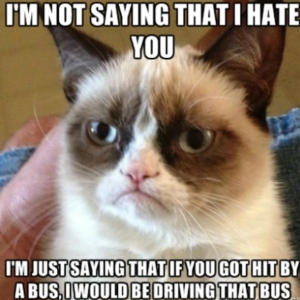With advancements in technology and the constant evolution of the digital landscape, the future of search engine optimization (SEO) and paid advertising is an intriguing subject. One potential game-changer in this field is Google’s Project Magi, a revolutionary project that aims to redefine how SEO and paid ads are approached. This ambitious initiative, backed by Google’s extensive resources and cutting-edge technology, has the potential to transform the way businesses optimize their online presence and reach their target audience. In this article, we will delve into the intricacies of Project Magi, examine its potential implications, and explore how it could shape the future of SEO and paid advertising.
- 9 Clever Ways Amazon FBA Business Owners Can Use ChatGPT
- 6 AI Joke Generator Options: Can Artificial Intelligence Make You Laugh?
- Artificial Intelligence in Sales: The Power of Smart Selling Strategies
- ChatGPT Plus vs ChatGPT vs Alternatives: 8 Paid & Free Chatbots To Test!
- ChatGPT for Sales: 7 Ways You Can Harness the Power of AI to Unlock New Opportunities
Google’s making big changes to search: Google Project Magi, a new type of search engine, will allow users to do transactions right there on Google without going to a website.
You are viewing: The Future of SEO & Paid Ads: Google Project Magi Explained
The release of Project Magi is going to change how we perform search.
In this blog post, we will dive into the details of Google Project Magi, its potential impact on SEO and paid ads, and offer tips for how to adapt to this new future of search.
What Is Google Project Magi?
Project Magi is a new type of search engine powered by AI that Google is working on.
It was initially launched in May 2023 to 1 million users within the United States and, depending how the trial goes, the company expects to expand this to 30 million users by the end of the year. Additional features will be released in Q4 2023. However, there is no official announcement yet on when Project Magi will be fully released to the public.
There are some rumors going around about Samsung potentially making Bing its default search engine, which would cost Google around $3 billion. If a similar thing also happened with Apple, it would cost them even more money:

Google’s getting nervous, of course, because everyone’s talking about AI and ChatGPT and how Microsoft’s integrating it. And when Google released Bard, it didn’t have the best reviews and their stock price went down (10% in one week!), losing them billions of dollars:

So Google search is getting an overhaul. Voila Google Magi!
Project Magi has about 160 engineers who are focused on it, and what they’re doing is trying to make Google Search more conversational, like ChatGPT.
This will be in direct competition to the ChatGPT-powered search engine Bing:

So for example, if you are looking for new running shoes, over time, it will learn the size of the shoe that you wear, if you have narrow feet or wide feet, as well as allow you – and this is the big one – to do a financial transaction right there on Google without going to a website. In other words, you can purchase these sneakers (or books or a new computer or an airplane ticket or anything else).
This is going to have huge implications for both paid ads and SEO – which we’ll dive into in a moment.
How Does This New Google Search Work?
Google Project Magi is an artificial intelligence search engine that uses a variety of AI techniques to understand natural language queries and provide more accurate and relevant search results:

These techniques include:
- Machine learning (ML): ML is a field of computer science that deals with the development of algorithms that can learn from data. ML techniques are used to train the NLP models that are used in Google Project Magi.
- Deep learning (DL): DL is a subset of ML that uses artificial neural networks to learn from data. DL techniques are used to train the NLP models that are used in Project Magi.
- Natural language processing (NLP): NLP is the field of computer science that deals with the interaction between computers and human (natural) languages. NLP techniques are used to understand the meaning of natural language search and to extract information from web pages. The one use of NLP that you may already have heard of is sentiment analysis:

What Are the Benefits of Using Google Project Magi?
Overall, Google Project Magi looks to be a powerful search engine that uses AI to provide a more personalized, conversational and visual search experience:
- Personalized search results: Uses AI to personalize search results for each user. This means that the results that you see will be tailored to your interests and preferences. It would adapt to a user’s needs over time, provide lists of preselected products to buy, offer follow-up information, etc.
- Conversational search: Allows users to interact with the search engines in a more conversational way. This means that you will be able to ask questions and get answers in a natural, conversational format.
- Visual search: Uses artificial intelligence to understand the visual content of web pages. You will be able to search for images and videos by simply describing what you are looking for.
- More accurate and relevant results: Uses AI to understand the meaning of natural language queries and to extract information from web pages. In other words, the results that you see will be more accurate and relevant to your needs.
- More engaging and intuitive search experience: Google Project Magi’s conversational and visual search features make the search experience more engaging and intuitive. This can make it easier to find the information that you are looking for.
What Are the Limitations of Google Project Magi?
Here are some of the limitations of Google Project Magi so far:
- Still in development: Project Magi is still in the experimental phase, so there may be some bugs or limitations.
- Not available to everyone: The search engine is currently only available to a limited number of users.
- May not be as effective for all queries: It’s still under development, so it may not be as effective for all queries, such as thouse that are not in natural language.
- May raise privacy concerns: Google Project Magi uses artificial intelligence to collect and analyze data about users’ search queries. This could raise privacy concerns for some users.
Dive Deeper:
* B2B SEO: How to Rank Your Business Website Higher in Search
* 100 SEO Statistics That’ll Help You Dominate Search Rankings in 2023
The Impact of Google Project Magi on SEO
The release of Project Magi has huge implications for SEO.
Traditionally, SEO has been about optimizing websites for keywords and phrases to rank higher in search results. However, with Project Magi, the search experience would become more conversational and personalized. This means that the focus of SEO would shift towards creating content that answers users’ questions directly and provides personalized solutions.
See more : What Is GPT-4 And How Will Advancements in AI Help Your Business?
Going back to our shoes example, if a user is looking for “the best running shoes for wide feet,” the focus of SEO would shift towards creating content that directly answers that query. The content would need to provide personalized solutions based on that user’s preferences, such as their shoe size and width.
People are afraid that Google would just be taking traffic away, but this might actually create a better search experience and cause more people to use Google Search in the long run. And according to Danny Sullivan, Google has continually driven more organic traffic to websites each and every year.
Look at what Google’s done in the past with, for instance, weather. It used to be when you wanted to search what the weather was in Los Angeles, California, or Vancouver, B.C., you would go to weather.com or Google would send you to a website. Now it just shows you the weather right there in search results:

And there were many more changes with things like the Knowledge Graph that ended up changing how SEO was done:

How Can SEO Professionals Adapt Their Strategies to Keep Up with Project Magi?
So with all these AI changes, I do believe it’s going to reduce traffic going to websites, but I also think it’s going to cause more people to use Google, which can help counteract that. And this won’t work for every single query out there.
This means that SEOs would need to focus on creating more conversational and personalized content that caters to users’ specific needs. They would also need to optimize their content for voice search queries, as more users would be using voice assistants to search for information.
Though the shift towards conversational search may have implications for the SEO industry, it’s not necessarily a bad thing.
In fact, it may present new opportunities for SEO professionals to optimize for conversational queries and long-tail keywords that may not have been as prevalent in traditional search results. Also, the emphasis on user experience and personalization could lead to more engaged and satisfied users, ultimately benefiting both consumers and businesses.
The bottom line is that Google search queries are going to change quite a bit. Probably in the next five years max, it’s going to be completely re-imagined.
And so I think in the next year or two, you should really crank up what you’re doing from what we’ve all known to be traditional SEO:
- Make sure you have strong domain authority. Domain authority is important for Google Project Magi because it is one of the factors that the search engine uses to determine the ranking of websites in the search results. Websites with high domain authority are more likely to rank higher than websites with low domain authority.
- Focus on creating high-quality content: This is always the most important factor in SEO, but it will be even more important with Project Magi. Use AI tools to help you create more content that’s high quality.
- Make sure your content is easy to understand and that it answers users’ questions in a natural language format: This will be essential for content that is optimized for conversational search.
- Optimize your content for images and videos: This will be important for content that is optimized for visual search.
- Stay up to date on the latest developments in Project Magi: This will help you to understand how the search engine is changing and how you can adapt your strategies accordingly.
Rather than freak out or resist, SEO professionals should just prepare for the changes that Project Magi will bring and keep working to make sure their websites are still visible in the search engine results.
Dive Deeper:
* 5 Steps to Optimize Your Content for Voice Search
* 17 Effective SEO Techniques to Drive Organic Traffic in 2023
* VSEO: How Voice Search and Conversational AI Are Changing SEO
The Impact of Project Magi on Paid Ads
Project Magi will also have a significant impact on paid ads.
- Currently, paid ads are based on a cost-per-click (CPC) model, where advertisers bid on specific keywords to appear at the top of the search results.
- With Project Magi, Google could switch to a cost-per-action (CPA) model, where advertisers only pay when a user completes a specific action, such as making a purchase.
Think of it this way. If you’re just paying Google for that cost, it doesn’t matter if someone goes to your website or not, because all you care about is: Are you generating the sale and is it profitable? Whether they come to your website or not, as long as you can keep generating more sales, you should be happy because that means more revenue from you.
This will have implications for advertisers, as they will need to optimize their ads for specific actions, rather than just clicks.
Maybe you’re not optimizing as much for clicks to your website, but maybe you’re optimizing for Google showcasing your product or service when someone’s using their prompt to converse with to figure out what product or service to buy.
How Can Advertisers Adapt Their Strategies to Keep Up with Project Magi?
Optimizing your ads for specific actions, rather than just clicks, can be challenging, but it is not impossible. It requires a deep understanding of your target audience and their needs, as well as the ability to create ads that are relevant and engaging.
Here are some tips for optimizing your ads for specific actions:
- Start by understanding your target audience. What are their needs and wants? What are they looking for when they search for your products or services? Once you understand your target audience, you can start to create ads that are relevant to their interests.
- Use clear and concise language in your ads. People are more likely to click on an ad if they can understand what it is about and what it is offering. Avoid using jargon or technical terms that your target audience may not understand.
- Make sure your ads are visually appealing. People are more likely to click on an ad if it is visually appealing. Use high-quality images or videos that will capture attention.
- Include a call to action in your ad. Tell people what you want them to do, whether it is to visit your website, sign up for your email list, or make a purchase.
- Track your results and make adjustments as needed. Once you have started running your ads, track your results to see what is working and what is not. Make adjustments to your ads as needed to improve your results.
- Use negative keywords: Negative keywords are words or phrases that you don’t want your ad to show up for. For example, if you sell shoes, you might want to add the negative keyword “free” to your ad campaign. This will prevent your ad from showing up for searches like “free shoes.”
- Use remarketing: Remarketing is a way to show your ads to people who have previously visited your website but not taken an action (made a purchase, signed up, etc.). This can be a great way to reach people who are already interested in your products or services and just need a little nudge.
- Use ad extensions: Ad extensions are additional pieces of information that you can add to your ads to make them more informative and, thus, lead to more clicks. For example, you can add your phone number, address or website link to your ad:

These tips can help you optimize your ads for specific actions and be ready for Google Magi, the new search engine.
Dive Deeper:
* Does Ad Quality Score Still Matter?
* Best Paid Media Agency: Top 5 Choices for 2023
* Best Paid Search Marketing Agency in 2023: Top 10 Choices
The Long-Term Implications of Project Magi on Jobs
The release of Project Magi will have long-term implications for jobs.
According to Jason Calacanis, host of the “All In” podcast, “most jobs are going to be nuked. At least a third of jobs will be nuked, if not more. This isn’t about phone operators, farmers or dishwashers — this is about knowledge workers. Your knowledge has been commoditized, your ability to be nimble and learn new skills is all that matters.”


The rate of innovation in AI is increasing, and companies like Google and Microsoft must invest heavily in AI to stay ahead of the competition.
See more : Novel AI Review: Is This The Best AI Story Generator Around?
And so I think we’re just going to see the rate of innovation continue to increase because Google is not going to want to give up their market share.
What Jobs Will Be Lost to This New Search Engine?
As for the potential job loss, it’s true that the advancements in AI and automation may lead to the displacement of some jobs.
Although it’s still too early to say definitively which jobs will be lost to Google’s Project Magi, there are a few jobs that are likely to be affected by the development of this new search engine.
- Search engine optimization (SEO) professionals: SEO professionals are responsible for optimizing websites so that they rank higher in the SERPs. As Project Magi becomes more sophisticated, it is likely that SEOs will need to adapt their strategies to keep up with the changes. This could lead to job losses in the SEO industry.
- Web content writers: Web content writers are responsible for creating content for websites. As Project Magi becomes more conversational, it is likely that web content writers will need to create content that is more natural language-based.
- Customer service representatives: Customer service representatives are responsible for answering customer questions and resolving customer issues. As Project Magi becomes more conversational, it is likely that customer service representatives will need to be able to interact with customers in a more natural language-based way.
Ultimately, the impact of Project Magi on the job market will depend on how it is used and how it evolves over time.
What Jobs Will Be Created by Google Magi?
It’s also important to remember that technological advancements have historically created new jobs and industries, and it’s likely that the same will hold true in this case.
The increased demand for AI and machine learning experts, as well as data analysts and digital marketers, may create new job opportunities in the tech industry, such as:
- AI research: Project Magi is powered by artificial intelligence, so there will be a need for AI researchers to develop and improve the search technology.
- Data science: The new search engine will collect and analyze a large amount of data, so there will be a need for data scientists to interpret and use this data.
- Software development: Google Magi is a software application, so there will be a need for software developers to create and maintain the software.
- User experience design: Google search results needs to be designed in a way that is user-friendly and intuitive. This will require user experience designers to create a great user experience.
Final Thoughts on Project Magi
Google’s Project Magi represents a significant shift towards conversational search results and personalized user experiences. While it may have implications for the SEO and advertising industries, it also presents new opportunities for innovation and growth.
As with any technological advancement, there may be some job displacement, but it’s important to remember that new industries and job opportunities may also arise.
Ultimately, the focus on improving the user experience and providing personalized, conversational search results is a positive development for both consumers and businesses.
Need help navigating your business’ SEO or paid ads in this new AI-driven landscape? Single Grain’s digital marketing & AI experts can help!👇
Google Project Magi FAQs
-
What is Google project Magi?
Google’s Project Magi is an innovative initiative that aims to revolutionize the online search experience by leveraging artificial intelligence to understand user intent, provide personalized results, and offer direct answers to queries, transcending the traditional keyword-based search approach.
-
Is Google worried about Bing?
In the context of Project Magi, it seems that Google is indeed concerned about Bing, particularly due to the advancements and user adoption Bing has achieved through integrating AI technologies like OpenAI’s GPT. Project Magi is seen as an initiative to combat the competition from AI-backed search engines like Bing.
Plus, Samsung’s consideration of replacing Google Search with Bing as the default option triggered a sense of urgency within Google, leading to the development of Project Magi. This move reflects Google’s proactive strategy to counter potential threats from Bing by investing heavily in AI technology to retain or enhance its edge in the search engine market.
-
What is the difference between Magi and Bard?
While Project Magi focuses on enhancing the search experience by understanding user intent and providing personalized results, Bard offers a conversational AI experience, assisting users in a variety of tasks including learning new topics and coding assistance. The two projects represent different facets of Google’s endeavors to integrate AI and machine learning into user-facing services.
In addition, Google Project Magi uses AI and machine learning to enhance the search engine’s ability to understand natural language and context, and users interact with Project Magi through search queries that result in direct answers to many questions instead of just listing websites that might have the answers.
On the other hand, Google Bard is powered by Google’s advanced Large Language Model (LLM) named PaLM 2, and operates as an AI chatbot, generating responses to user-provided natural language prompts and even assisting with programming and software development tasks such as code generation, debugging, and explanation.
-
What will replace Google search?
It’s difficult to definitively say what, if anything, will replace Google Search, as it remains the dominant search engine globally. However, there are several scenarios and technologies that could potentially influence the future of online search:
- Emergence of New Competitors: New search engines or existing competitors like Bing, DuckDuckGo, or others might gain market share with unique features, better privacy practices, or superior technology.
- Decentralized Search Engines: Blockchain-based or decentralized search engines could gain popularity by offering better privacy and data control to users.
- Specialized Search Platforms: Users might lean towards specialized search platforms for certain types of queries, such as Amazon for shopping or Yelp for restaurant reviews.
- Integration of Augmented Reality (AR) and Virtual Reality (VR): AR and VR technologies might introduce new search platforms that provide immersive and interactive search experiences.
- Semantic Web: The development of the Semantic Web, where data is well-defined, could lead to more intelligent search systems that understand user intent and context better.
- Social Search: Social media platforms might expand their search functionalities, becoming alternative search engines for certain types of information, as YouTube is already becoming.
That’s a wrap on “The Future of SEO & Paid Ads: Google Project Magi Explained” We hope you’ve found a trove of useful insights and fresh perspectives. Your opinions and ideas matter to us—join the conversation below and share your take! Hungry for more tech insights? Dive into our diverse collection of articles where innovation meets practicality. Discover More AI Softwares.
Stay in the loop with the latest in AI and tech – your journey into the digital future continues at apkguild.com.
#Future #SEO #Paid #Ads #Google #Project #Magi #Explained
Source: https://apkguild.com
Category: AI





